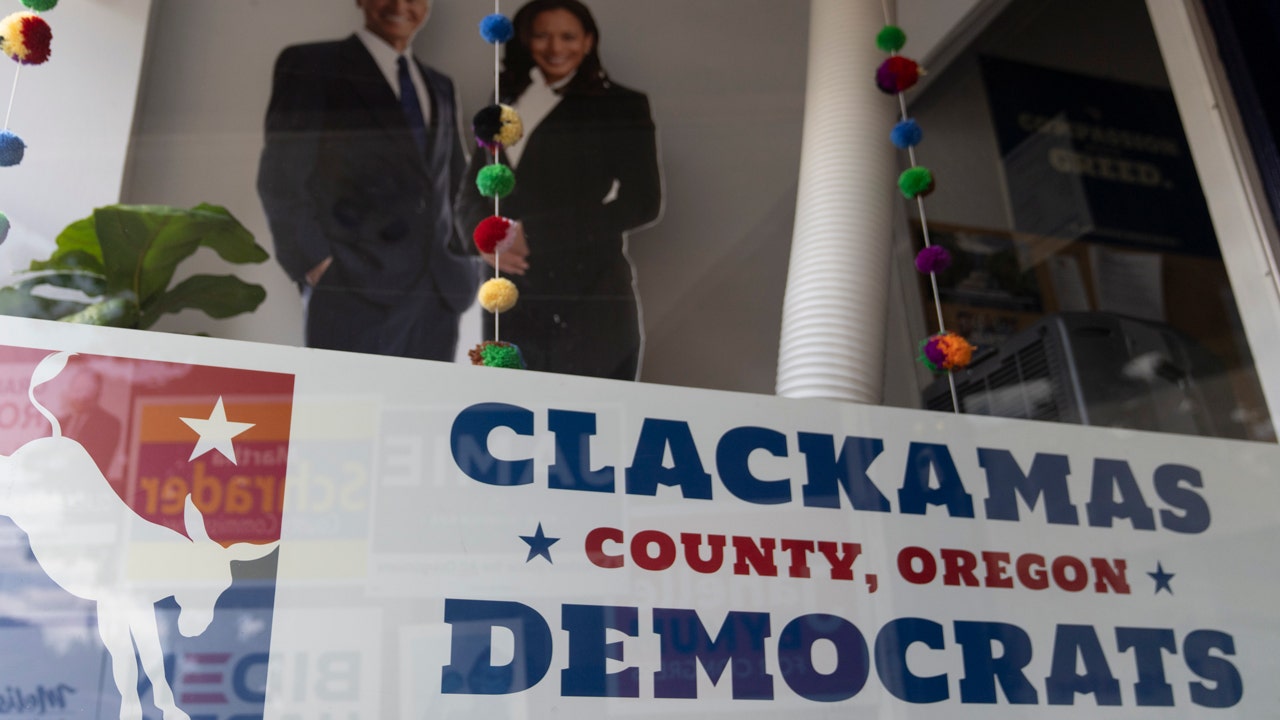Two Democratic primaries for U.S. House seats in Oregon could help reveal whether the party’s voters are leaning more toward progressive or establishment factions in a critical presidential election year.
The state’s 3rd Congressional District, which includes much of liberal Portland, will have its first open Democratic primary since 1996 with the retirement of U.S. Rep. Earl Blumenauer.
Two candidates with similar platforms are leading in fundraising: Maxine Dexter, a doctor and two-term state representative, and Susheela Jayapal, a former county commissioner endorsed by U.S. Sen. Bernie Sanders of Vermont. Jayapal is the sister of U.S. Rep. Pramila Jayapal from Washington state, who chairs the Congressional Progressive Caucus.
REPUBLICAN AIMING TO FLIP KEY SENATE SEAT IN DARK BLUE STATE GETS PRAISE FROM THESE TOP DEMS
While outside money and claims of Republican meddling have marked the race, national Democrats can safely bet on holding the solidly blue district as they seek to overturn the GOP’s thin majority in the House. Party leaders are more keenly eyeing the state’s 5th Congressional District, which will likely be home to one of the most competitive races in the country.
“This is one of the big swing districts nationally that both parties are really looking for to hold on to, or recapture, the House,” Ben Gaskins, associate professor of political science at Lewis & Clark College, said of Oregon’s 5th District. “I think that the big question is, to what degree are the Democratic voters really going to prioritize electability?”
Eager to reclaim the 5th District after it was flipped by the GOP in 2022 for the first time in roughly 25 years, congressional Democrats are supporting Janelle Bynum. They see her as having a better chance of winning in November than Jamie McLeod-Skinner, the progressive who in the 2022 midterm primary ousted the Democratic moderate who long held the seat and then lost to Republican Lori Chavez-DeRemer in the general election, Gaskins said.
A sign is displayed at the Clackamas County Democratic party building in Oregon’s 5th Congressional District, on May 17, 2024, in Oregon City, Oregon. Two Democratic primaries for U.S. House seats in Oregon could help reveal whether the party’s voters are leaning more toward progressive or establishment factions. (AP Photo/Jenny Kane)
“I think many Democrats are going to hold that against her,” he said of McLeod-Skinner’s narrow 2022 defeat. “She had a chance. She lost.”
Key Democrats have endorsed Bynum, including Oregon Gov. Tina Kotek and three of the state’s U.S. representatives.
The U.S. House Democrats’ fundraising arm, the Democratic Congressional Campaign Committee, named Bynum to its “Red to Blue” program, noting Bynum previously defeated Chavez-DeRemer in legislative elections. The program provides organizational and financial support to Democrats running to flip GOP districts.
Meanwhile, a late flood of spending from a political action committee on behalf of McLeod-Skinner has raised questions about whether Republicans are trying to tilt the scales in favor of a more progressive candidate whom they see as easier to beat in a general election.
Rep. Richard Hudson, chairman of the campaign arm for House Republicans, said he had no knowledge of Republicans getting involved in the Democratic primary.
The boundaries of the 5th District were significantly redrawn following the 2020 census. It encompasses disparate regions spanning metro Portland and its wealthy and working-class suburbs, as well as rural agricultural and mountain communities and the fast-growing central Oregon city of Bend on the other side of the Cascade Range.
“I think candidates are trying to figure out exactly what the secret sauce is for this district, because there are just so many different interests here,” said Chris Koski, a political science professor at Reed College in Portland.
McLeod-Skinner, an attorney who has served in multiple local governments, lives in central Oregon with her wife and pitches herself as someone who can bring together rural and urban voters. Her campaign website says that while attending high school in southern Oregon, she helped support her family “by mucking horse stalls and bucking hay.” This is her third time running for Congress.
Bynum, from Washington, D.C., was elected to the Oregon House in 2016, representing the suburbs southeast of Portland. She has served on the chamber’s small business committee and is the owner of four McDonald’s franchises.
Both women studied engineering and have similar policy stances. They support abortion protections, lowering health care costs and tackling climate change.
As of late Friday, Bynum had outraised McLeod-Skinner by about $385,000. But much of the money in the race has been outside spending from super PACs. Such groups can’t contribute directly to campaigns, but can spend unlimited amounts of money on advertising for or against candidates.
A PAC called Mainstream Democrats has spent nearly $380,000 in support of Bynum and the same amount opposing McLeod-Skinner, federal campaign finance filings show.
Though both candidates have engineering degrees, the 314 Action Fund, which says it focuses on electing Democrats with science backgrounds to Congress, has spent more than $470,000 on ads and mailers in support of Bynum.
The super PAC also has invested heavily in Oregon’s 3rd District, spending nearly $2.2 million on ads supporting Dexter, a pulmonologist.
Another PAC, the recently created Voters for Responsive Government, has spent $2.4 million opposing Jayapal.
Jayapal and McLeod-Skinner have criticized what they call “dark money” flowing into the races.
Jayapal has suggested the 314 Action Fund’s spending in the 3rd District is linked to “MAGA Republican mega-donors.” Her campaign manager, Andrea Cervone, said in an email there has been “a growing trend across the country of billionaires and millionaires with a history of giving to MAGA Republicans” funneling money into Democratic primaries, but didn’t provide a specific example of how the group is linked to such donors.
Cervone said the 314 Action Fund raised and spent much of its money in April, meaning the group won’t have to disclose its donors until the next federal filing deadline on May 20, the day before the election.
314 Action Fund’s president Shaughnessy Naughton said in an emailed statement that the group she founded has spent millions of dollars to “defeat MAGA Republicans.”
“It is beyond the pale and an act of desperation for Susheela Jayapal’s campaign to make these false charges,” she said.
In a statement this month in response to the comments about “dark money,” Dexter condemned the outside spending on ads targeting her opponent: “I do not condone or support these negative ads in any way and remain committed to a positive conversation.”
Dexter’s campaign also has been boosted recently by direct contributions from individuals. She reported raising more than $218,000 on a single day earlier this month, including from donors who previously donated to Republican candidates and the American Israel Public Affairs Committee, or AIPAC, federal filings show.
Jayapal touts herself as being the first candidate in the race to call for a cease-fire in Gaza.
With the Democratic frontrunners in each race largely sharing policy platforms, voters may have to choose based on style. Dexter and Bynum highlight their legislative records, while Jayapal and McLeod-Skinner lean into their progressive endorsements, Gaskins said.
“That pragmatism versus idealism divide in the Democratic electorate, I think, will be the biggest way to distinguish them,” Gaskins said. “Is it about taking the boldest progressive stance on the issues or emphasizing being able to get things done?”



